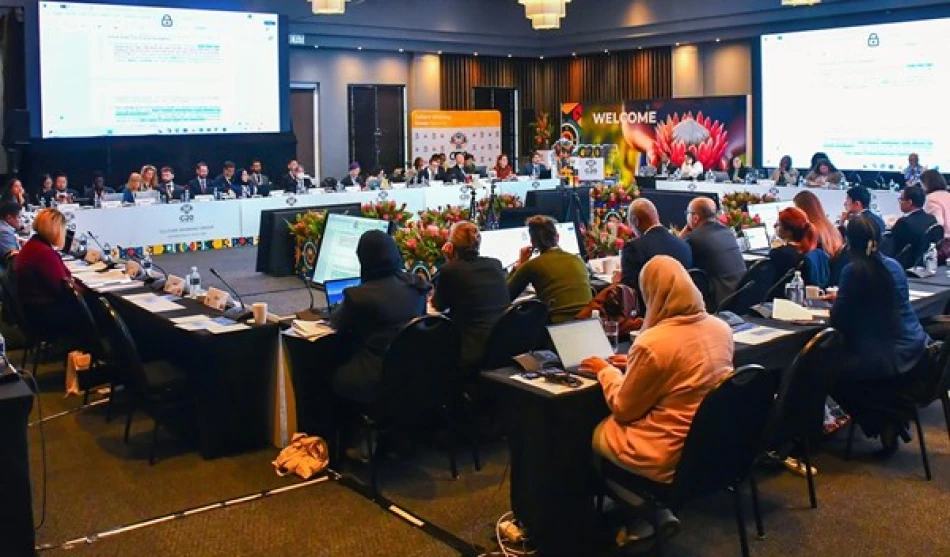
UAE Showcases Integrating Knowledge and Cultural Heritage into National Climate Strategies
UAE Leverages Cultural Heritage as Climate Action Tool at G20 Summit
The United Arab Emirates is positioning culture and traditional knowledge as strategic weapons in the global fight against climate change, showcasing innovative approaches at the G20 Cultural Working Group meeting in Cape Town. This move signals a broader shift among nations to integrate cultural policies into climate strategies, potentially unlocking billions in creative economy investments while addressing environmental challenges.
Culture Meets Climate: A New Diplomatic Frontier
The third G20 Cultural Working Group meeting, held under the theme "Solidarity, Equality, and Sustainability," brought together high-level representatives from member nations to explore how cultural industries can drive climate adaptation and sustainability. The UAE delegation, led by Shatha Al Mulla, Assistant Undersecretary for National Identity and Arts at the Ministry of Culture, participated in discussions that could reshape how governments approach both cultural preservation and environmental policy.
This intersection represents more than academic discourse. With the global creative economy valued at over $2.25 trillion annually, integrating cultural strategies into climate action could unlock significant funding streams while preserving endangered traditions threatened by environmental changes.
UAE's Post-COP28 Cultural Climate Strategy
The Emirates' participation builds directly on its leadership role following the hosting of COP28, where the nation demonstrated its commitment to climate innovation. By presenting case studies on integrating cultural knowledge and heritage into national climate strategies, the UAE is translating its COP28 momentum into practical policy frameworks.
Traditional Knowledge as Modern Solutions
The UAE's approach focuses on leveraging traditional environmental knowledge—such as ancient water management systems, sustainable building techniques, and indigenous agricultural practices—as solutions for contemporary climate challenges. This strategy mirrors successful initiatives in countries like Singapore, which has integrated traditional urban planning concepts into its "City in a Garden" climate adaptation model.
Market Implications and Investment Opportunities
The cultural-climate nexus presents substantial market opportunities. The carbon footprint of the cultural sector, while significant, offers pathways for circular economy solutions that could attract ESG-focused investors. Countries positioning themselves early in this space, like the UAE, may capture first-mover advantages in emerging markets for sustainable cultural tourism, green creative industries, and climate-resilient heritage preservation technologies.
The UAE's ambitious 2050 net-zero strategy gains additional credibility through cultural integration, potentially making it more attractive to international investors seeking comprehensive sustainability approaches rather than purely technological solutions.
Strategic Positioning in Global Governance
The UAE's fourth consecutive participation in G20 cultural initiatives—following invitations in 2022, 2023, and 2024, plus historical participation in 2011 and 2020—demonstrates sustained diplomatic investment in cultural soft power. This consistency positions the Emirates as a bridge between traditional Gulf values and progressive climate action, potentially influencing broader Middle Eastern approaches to environmental policy.
October Ministerial Preparations
The upcoming preparatory meeting in KwaZulu-Natal province and the October 29 G20 Culture Ministers' meeting will test whether the UAE's cultural-climate integration model gains broader international adoption. Success could establish new frameworks for measuring cultural contributions to climate goals, potentially influencing how international climate finance is allocated.
Broader Implications for Climate Diplomacy
The UAE's strategy reflects a sophisticated understanding that climate action requires more than technological and economic measures—it demands cultural transformation. By positioning culture as both a climate solution and a diplomatic tool, the Emirates is crafting a narrative that resonates with developing nations rich in traditional knowledge but lacking technological resources.
This approach could prove particularly influential as the G20 leaders' summit approaches in November in South Africa's Gauteng province, where cultural climate integration may emerge as a key theme in global climate governance discussions.
Most Viewed News

 Layla Al Mansoori
Layla Al Mansoori






